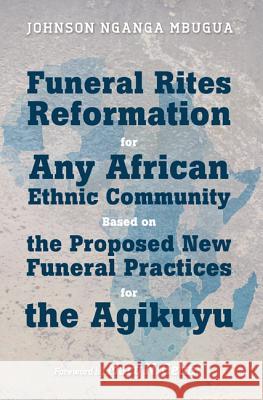Funeral Rites Reformation for Any African Ethnic Community Based on the Proposed New Funeral Practices for the Agikuyu » książka
Funeral Rites Reformation for Any African Ethnic Community Based on the Proposed New Funeral Practices for the Agikuyu
ISBN-13: 9781498290906 / Angielski / Miękka / 2016 / 314 str.
Funeral Rites Reformation for Any African Ethnic Community Based on the Proposed New Funeral Practices for the Agikuyu
ISBN-13: 9781498290906 / Angielski / Miękka / 2016 / 314 str.
(netto: 136,04 VAT: 5%)
Najniższa cena z 30 dni: 142,44
ok. 16-18 dni roboczych.
Darmowa dostawa!
This book has been written on the premise that the mode of coping with death of virtually all African ethnic communities has taken proportions and turns that are neither cultural, scriptural, nor necessary. Current rites are complicated, time-consuming, expensive, and are leaving most families and their neighbors impoverished. They have been extremely commercialized and a large number of Africans do not have resources to bury their dead the ""modern"" way. Were the Agikuyu (read: Africans) to curb numerous funeral demands which they deem necessary and ""customary,"" when in actual fact they are not, funerals for them would become cheaper, faster, and simpler; would be decent enough for the dead; would take care of those left behind; and would be environmentally friendly. How Africans in the Diaspora, away from their ancestral homeland, should cope with death is also addressed. Also addressed is the issue of cremation. It is shown that at the resurrection, God will accord us new spiritual bodies which will have no bearing with the material substance of our earthly (mortal) bodies.""In African culture, proper burial is a matter of utmost importance. However, the expenses involved can be crippling for families. In a work that should be relevant across the continent, Mbugua proposes a better way that is thoroughly African and Christian."" --Kevin G. Smith, Vice Principal, South African Theological Seminary""Mbuguas book achieves its objectives and has merits on several levels, the most important being that it is written by one who has brought to his work not only a critical attitude to the Agikuyu Christian funeral rites, but also an observers impression."" --Christopher Byaruhanga, Professor of Systematic and Historical Theology, Uganda Christian University""The author made his basic point very clear: the present death and funeral practices of the Agikuyu (and we can say it also of our own cultures, I think) have little basis in either traditional burial practices, nor the Old or New Testament traditions, nor the early Christian practices. It could--and sometimes should--be changed.""--Johan Jakob Kritzinger, Emeritus Professor of Missiology, University of Pretoria""Not all the recommendations [Dr. Mbugua] makes will sit well with modern African Christians, but it is in debating such ideas that the inevitability of cultural change will happen. . . . I highly recommend this well-researched book to scholars and practitioners.""--Faith Nguru, Deputy Vice Chancellor Academic Affairs, Riara University, Nairobi""Mbugua has brought to the forefront the cultural disrespect of the dead, the Christian view to call for dialogue, the respect we should bring to the disposal of the dead, and the Christian hope for the future of the beloved ones. I append my approval to Mbuguas work and the way it opens the minds of many about the dying, the dead, and the relatives who are left behind."" --Peter Njenga Karioki, Retired Bishop of the Anglican ChurchJohnson Mbugua is an alumni of SATS where he earned his MTh cum laude in Christian History in 2011. Still at SATS, he earned his PhD (Practical Theology) in 2014. In the course of his career, he observed how people coped with death and the problems they faced. This led him to carry out this research and writing. His other works include Mumbis Brideprice (a novel), Longman (1971), and Faith of the Agikuyu Christian Martyrs (2011).











